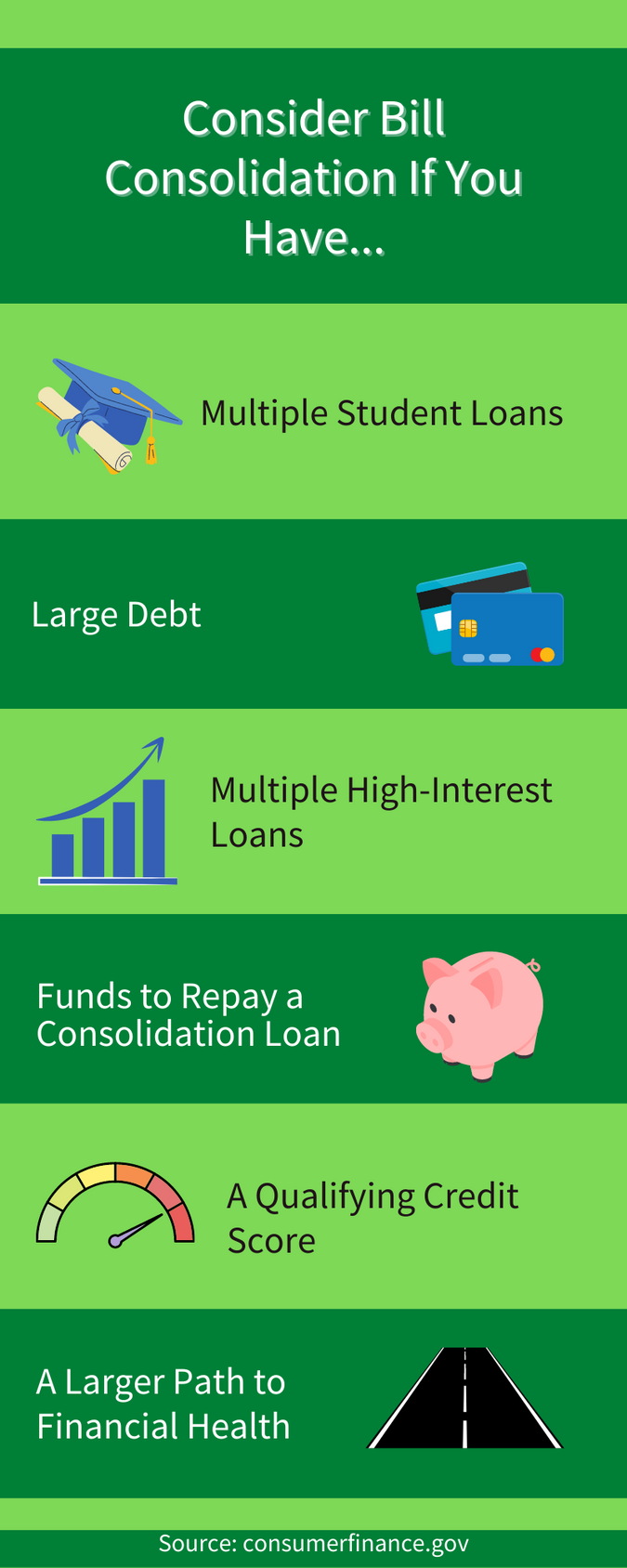When Is It Worth It To Consolidate Your Bills?

Consolidating debt means combining debts under one umbrella at a good interest rate. When should you consider consolidation for your debt? In this article and the GOBankingRates infographic below, we share a few common scenarios in which it makes sense to consolidate your bills.
Learn More: 9 Bills You Should Never Put on Autopay
Find Out: Unplug These Appliances That Hike Up Your Electricity Bill
Let’s take a look at debt that may be eligible for consolidation and the next steps to take once you decide to consolidate your debt.
When You Have Multiple Student Loans
If you have multiple student loans, you may want to refinance your student debt or consolidate the debt if you are ineligible for refinancing. Consolidating student debt combines all of your existing loans into one loan and at a new interest rate that is the weighted average of your previous loans. This allows borrowers to simplify their cash flow and payment process.

Before you consolidate student loans, however, it’s important to keep the following aspects in mind. First, borrowers may only consolidate federal student loans. Private loans are not eligible for consolidation. Second, a new interest rate through consolidation does not change your interest rate. What it does is averages all your rates together which can help make it easier to manage payments.
Take Our Poll: Do You Think the Government Should Increase SNAP Benefits?
When You Have Large Debt
Large debt often includes credit cards. Francis Collins SVP, credit at Teachers Federal Credit Union, said debt consolidation is ideal for individuals who have multiple credit card debts. Large credit card debt includes high balances and high interest rates.
Barry Rafferty — senior vice president and head of capital markets at Freedom Financial Asset Management, the asset management and lending arm of Freedom Financial Network — said it can be an excellent idea to consolidate if you have multiple credit card accounts and carry debt on these accounts with high interest rates.
“Many people have a hard time juggling payment dates and making sure they make every payment on time each month,” said Rafferty. “Working with a debt consolidation loan eliminates the risk of late payments and mounting interest for many different bills, and stress of trying to manage it all.”
When You Have Multiple High-Interest Loans
Similar to student loans and credit cards, if you are saddled with any other types of high-interest loans or have “sore thumb” debt, you may explore the best debt consolidation option to save on interest and pay off the debt.
Next Steps for Debt Consolidation
Once you know you’re ready to consolidate your debt, or have any of the aforementioned debt that qualifies for debt consolidation, Rafferty recommends taking these next steps.
Understand Your Debt Situation
Before you begin looking at debt consolidation methods, Rafferty said the first step is to understand your particular debt situation. Beyond organizing your current debts and making sure you have repayment capability, you should be able to confront the real issue behind the need to consolidate debt.
“Most people find that working to consolidate and eliminate debt means they need to change some habits, and make a serious commitment to the payment plan,” said Rafferty. If you have previously been living beyond your means, now is the time to create and stick to a budget.
Choose the Best Debt Consolidation Loan
While there are several consolidation options available, like home equity loans or a cash-out refinance, most individuals consolidate debt with a consolidation loan. Use this time to shop around for the best offer and find a lender with whom you can communicate well.
“Many potential borrowers benefit by working with a lender that has loan consultants who will work with them to determine the best terms and rates, and who can take time to understand their credit situation, as well as other factors that indicate they are financially responsible,” said Rafferty.
As you shop around for the best consolidation loan, ask about any available discounts. Rafferty uses the example that some lenders have rate discounts when there’s a solid co-borrower or when retirement savings have reached a certain level.
Prep Your Credit Profile
Interest rates are heavily dependent on credit scores, so Rafferty recommends applying for a consolidation loan with the best possible credit profile. (Some lenders may require a certain number of years of credit history before you can apply.)
“In most cases, higher credit scores bring lower interest rates,” said Rafferty. There are cases where lenders will still be able to lend consolidation loans to consumers with poor credit scores, but the caveat is a much higher interest rate.
It’s also helpful to know your debt-to-income ratio. Rafferty said many lenders will require it to be less than 40%.
Complete the Application
Once you have the best consolidation loan offer for your debt, the next step is to complete the application and pay off the debts.
After the debts have been paid off, you’ll be able to have much more financial wiggle room to repay the loan and turn around your financial situation to get back on track to achieving financial freedom.
More From GOBankingRates
This article originally appeared on GOBankingRates.com: When Is It Worth It To Consolidate Your Bills?
